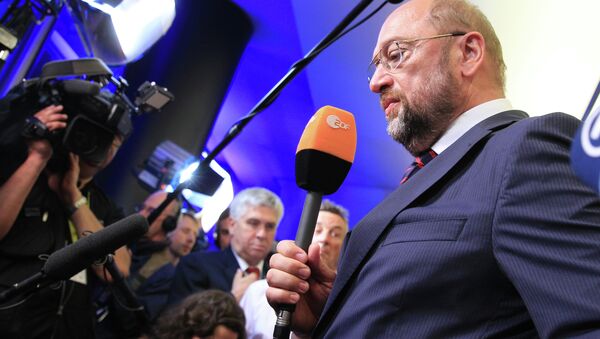Schultz's undiplomatic remarks sparked a row when he told Germany's Deutschlandfunk radio station: "What is happening in Poland has the character of a coup d'état and is dramatic. I assume that this week or in January at the latest we will have to discuss this extensively in the European parliament."
His remarks brought immediate condemnations from the highest levels in Warsaw, with Prime Minister Beata Szydło describing them as "unacceptable" and demanding an apology.
Poland wants Martin Schulz to know that EU member states have "good memories" #Polishsunnyvibes https://t.co/EZGG3Ciclu
— Zoltán Aszód (@ZwKrakowie) December 18, 2015
Poland's government — led by the Law and Justice party since October, when it won the election — has appointed five judges to the Constitutional Tribunal, which is supposed to make independent rulings, leading to protests accusing the Szydlo government of political interference in constitutional affairs.
Since coming to power, the Warsaw administration has eased out the head of the anti-corruption agency, announced plans to overhaul public media and limited opposition oversight of its surveillance services, which many believe are unconstitutional moves.
— Andrej Matisak (@matisaksk) December 17, 2015
There are certainly big question marks in Poland today, but when @MartinSchulz talks about coup d’etat he’s clearly completely off track.
— Carl Bildt (@carlbildt) December 16, 2015
Schultz's intervention came less than a month since he came under fire for criticizing Poland's anti-immigrant stance, saying the country lacked "solidarity" with other member states. He comments drew immediate reaction from interior minister Mariusz Błaszczak who accused Schultz of "German arrogance."
No Apology
Schultz met Szydlo at the European Council Thursday, but when he was asked by a journalist from Polish TV whether he had apologized, he remained tight-lipped, appeared to stumble his words, but defiantly refused to admit he had apologized.
The Polish TV reporter asked Schultz: "The Polish Prime Minister was expecting you to apologize for the words. And you mentioned there would be a debate organized in January in the European Parliament and that you wished that she would take part in that debate. Just a simple question: did you apologize and did she accept the invitation?"
To which Schultz replied: "I had a fruitful exchange with the prime minister. We didn't mention the debate in the European Parliament in January, therefore the question was not raised. We had an exchange which… her…"
At this point, Schultz appeared to be fighting for his words.
He continued: "It was a meeting of the president of the European Parliament and the new prime minister of Poland. Not the first one… we met during the meeting of the last council and we assured each other that, on the basis of full, mutual institutional respect we will try to cooperate constructively."
With that, he looked directly at the reporter and gave a quick smile before looking away — having both failed to address her question nor mention any apology to the Polish prime minister.



